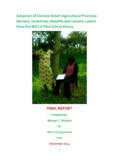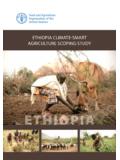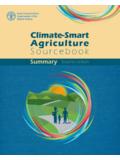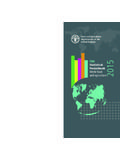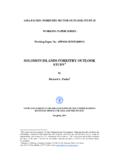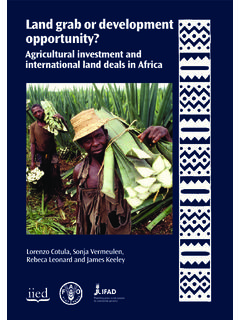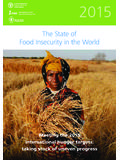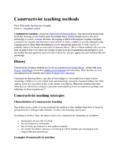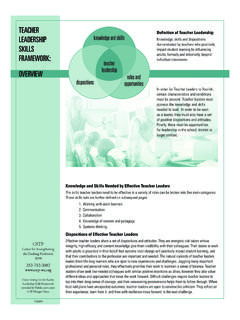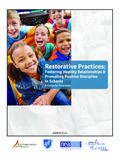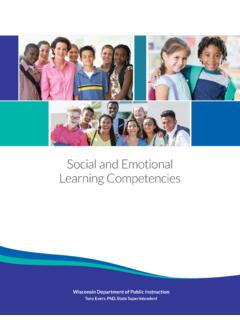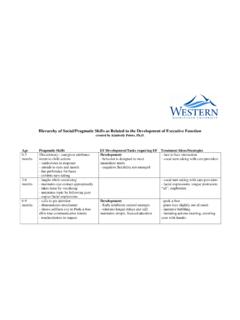Transcription of Negotiation Theory and Practice
1 Negotiation Theory and Practice A Review of the Literature EASYPol Module 179 Negotiation Theory and Practice A Review of the Literature Tanya Alfredson, John Hopkins University, Baltimore, Maryland, USA and Azeta Cungu, Agricultural Policy Support Service, Policy Assistance and Resource Mobilization Division, FAO, Rome, Italy for the Food and Agriculture Organization of the United Nations, FAO FAO Policy learning Programme aims at strengthening the capacity of high level policy makers in member countries in the field of policies and strategies for agricultural and rural development by providing cutting&edge knowledge and facilitating knowledge exchange, and by reviewing practical mechanisms to implement policy changes.
2 About EASYPol EASYPol is a an on&line, interactive multilingual repository of downloadable resource materials for capacity development in policy making for food, agriculture and rural development. The EASYPol home page is available at: EASYPol has been developed and is maintained by the Agricultural Policy Support Service, Policy Assistance and Resource Mobilization Division, FAO. The designations employed and the presentation of the material in this information product do not imply the expression of any opinion whatsoever on the part of the Food and Agriculture Organization of the United Nations concerning the legal status of any country, territory, city or area or of its authorities, or concerning the delimitation of its frontiers or boundaries.
3 FAO January 2008: All rights reserved. Reproduction and dissemination of material contained on FAO's Web site for educational or other non&commercial purposes are authorized without any prior written permission from the copyright holders provided the source is fully acknowledged. Reproduction of material for resale or other commercial purposes is prohibited without the written permission of the copyright holders. Applications for such permission should be addressed to: Policy learning Programme Negotiation Theory and Practice : A Review of the Literature Table of contents 1. Introduction .. 1 2. Negotiation and Policy&Making 2 3. Negotiation Theory : Foundations and Approaches .. 6 Basic concepts of 6 Negotiation approaches: An 9 Structural approach.
4 9 Strategic 10 Behavioral 13 Processual 15 Integrative 15 Summary of approaches .. 17 4. Practical Steps to Integrative Bargaining: The Seven Elements of Principled 18 Identifying Alternatives ..20 Identifying Criteria/Legitimacy ..21 Commitments ..23 Communication ..24 5. Conclusions .. 25 6. Readers 26 Time requirements ..26 EASYPol 7. References and Further Readings .. 26 Module metadata .. 31 EASYPol Module 179 Conceptual and Technical Material FAO Policy learning Programme Negotiation Theory and Practice : A Review of the Literature 1 major public policies are the outcome of a complex round of Negotiation between interests, choices between values and competition between there are no single best options for any player in this game, for the best outcome depends on what others do and what deals are possible.
5 (Davis , 1993) 1. INTRODUCTION Pure conflict defined as the existence of competing interests between parties in absence of interests that are shared, is an anomaly in international relations where the defining feature of the relationship between states is mutual dependence. Such was the observation of Thomas Schelling, noted international economist, during the height of the Cold War. In the decades that have since transpired, globalizing developments in technology, communications, finance and trade have given rise to a world in which citizens, organizations and governments engage in millions of trans-national interactions on a daily basis. In the modern age, the need for developing mechanisms and skills to manage daily exchanges has grown, as has the necessity for smoothly navigating through the impasses that arise when the satisfaction of one nation s interests, values or goals depend on the actions or intentions of another.
6 At the national level, policies must address, and if possible, resolve tensions between the often divergent interests of an array of stakeholders. In the agricultural sphere these may include producers, consumers, business owners, laborers and environmental interest groups as well as both local and national governments. Governments must grapple with competing concerns related to environmental degradation, cultural preservation, or matters of economic interest, while also upholding national commitments related to international law and commerce. It is unsurprising then, that in the decades since World War II and increasingly following the Cold War, a field devoted to Negotiation Theory has emerged.
7 Thanks to contributions from scholars and practitioners across disciplines as varied as economics, law, international relations, psychology, mathematics and conflict management, a literature on Negotiation now exists to help practitioners make better sense of the dynamics of Negotiation . The FAO helps developing and transitioning countries to develop and modernize agriculture, forestry and fisheries practices and to ensure good nutrition for people of all nationalities. In support of these aims, the FAO also acts as a neutral forum where nations meet as equals to negotiate agreements and debate policy. This paper was prepared in the framework of a capacity building programme that FAO organized to address major strategic issues and policy challenges for agriculture and rural development, in developing countries.
8 The programme aimed at enhancing the capacity of senior officials by providing cutting-edge knowledge, facilitating exchange, and reviewing practical mechanisms to implement policy changes in a context where policy space is increasingly limited by regional and international agreements and treaties. Owing to the EASYPol Module 179 Conceptual and Technical Material 2 increasingly important role that Negotiation plays in policy-making processes, policy experts are becoming more and more aware of the need for mainstreaming Negotiation into the policy cycle. To address a demand to enhance participants knowledge of Negotiation and related skills, the programme contains a component which instructs on the Practice of Negotiation through a combination of Theory and practical application.
9 This paper is intended as an easy-to-read reference material on Negotiation . It presents an overview of the defining theoretical perspectives, concepts and methods that are central to the Theory and Practice of Negotiation . The paper is structured in the following manner. Section two discusses the relevance of Negotiation to policy-making processes. Section three discusses the foundations of Negotiation Theory , introduces basic definitions and concepts, and provides an overview of some of the main schools of thought contributing to the existing Negotiation literature. Section four provides an overview of the essential elements of principled negotiations, and section 5 concludes.
10 Readers can follow links included in the text to other EASYPol modules or references1. See also the list of EASYPol links included at the end of this module2. 2. Negotiation AND POLICY-MAKING PROCESSES In an increasingly globalised world, policy-making is a matter of national and regional as well as international significance. For instance, it has been argued that policy formation related to international trade agreements should take into account broader issues of public welfare, natural resource management and local subsistence economies in order not to jeopardize the development and poverty reduction prospects of developing nations and avoid an increase in domestic conflicts (Hall, 2006; Ramirez, 1999).


